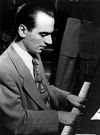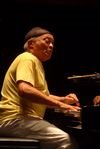




So... Easter finished, the daughter arrived back just now in the Principality (only stuck in Newtown for an hour, which for the mickey mouse railway we have in the U.K. is not bad). And I'm day-dreaming of New York... and I go to Mordor - whoops, sorry - Wales - next week if the health will stand it for some convalescing and chilling out with my girl and my grandson. But for now - Piano players... Lennie Tristano, Duke Ellington, Thelonious Monk, Matthew Shipp, Cecil Taylor...
First off – the Lennis Tristano track, which comes from a recording session featuring the winners of Metronome magazine's annual awards in 1950. The title gives the period, when 'mouldy figges' were what boppers called the traditional jazz brigade who disliked modern jazz and saw it as an aberration. I started off with traditional jazz at a very early age but quickly crossed to modern and beyond – yet the initial grounding gave me a sense of where the music came from and I still love all the old stuff and could never understand the animosity between the two camps - although I was glad to see the back of those duffel-coats. An all-star line-up, a short track, a Tristano composition based on'Indiana.' Brief solos all round: Konitz, at that time one of the few alto players with his own voice and not under the heavy manners of Bird, airy and intelligent, Getz – a prickly, unlovable character apparently but also always his own man, Kai Winding's bluff trombone, Buddy de Franco on clarinet which was rarely featured in bop (although he recorded some tracks with Tristano which I have somewhere and will dig out) – he plays a typically elegant chorus, followed by Chaloff on baritone. Tristano submits a brief, double timing virtuosic rippling solo that echoes the odd theme – which starts in double time in a fluttering like a scatter of birds before it resolves into a steady mid tempo. Max Roach is nearly inaudible, unusually quiet – whether by recording balance or the composer's design – Tristano was famous for disliking flash drumming. A slight echo of Miles et al's 'Birth of the Cool, from the previous year? Also - note the light, higher register all the saxes utilise -even the baritone. Cool school writ large...
The Monk is from last year's wonderful archeological treasure that surfaced (alongside the lost Bird and Diz concert) – the Library of Congress recording of his quartet when Coltrane was in the group. Great sound, the themeplayed in unison by Monk and Coltrane, one of those Monk originals that seem almost simple – but aren't – and springs completely from within the jazz tradition. Coltrane sounds happy here, fast and supply scampering across the changes pointed up by Monk's proactive piano – almost a duet in places, Monk dropping bits of the theme in here and there as pointers, fading back a bit as Coltrane builds up his solo. Sturdy bass walking and sharp, aggressive drumming from Shadow Wilson. In comes Monk, space and rhythmic displacement, some quite long lines and that descending whole tone run he used, more as a rhythmic device.
To – Coltrane and Duke. This tune, an odd little riff blues played in unison by piano and tenor sax. A brief chorus from Duke, then Coltrane – always a complex – but consummate – blues player. Busy drums- Elvin Jones - bunt it along. Coltrane worrying at a theme fragment and stretching it out every which way. Couple of choruses of bass – adequate Garrison, prodded by Duke in the second. Back into Coltrane – theme then again in unison as the drums rise up.
To see where Duke could really go on piano, here's the title track from 'Money Jungle,' the album he recorded with Charles Mingus and Max Roach, that provided a few revealing insights into his playing – one can hear where Monk comes from in some places. Duke certainly takes no prisoners here - this is steamy, violent playing by all three.
Monk recorded a collection of Ellington themes for Riverside – apparently to try and broaden his appeal. Never that rated by critics, I find them fascinating... here' s his brief take on 'Mood Indigo.' And, what the hell, 'Sophisticated Lady.' More 'Monkish' on the latter, I feel, at a slow lope – but the line down from stride piano via Duke to Monk reflects back and forth up and down the timeline. Monk could slip into stride - Duke could sound abrasively and contemporarily chromatic as can be discovered on the previous track. Clarke and Pettiford are solid and subtle, staying out of the way most of the time. An interesting contrast to Shadow Wilson above – or Blakey who was the best sparring partner for old Thelonious, down the years.
Matthew Shipp recorded 'Pastoral Visions' after a lot of experimenting with hip hop and electronic textures that cross-fertilised his avant-jazz with modern urban music. Almost a straight blues that could have been found on an old Blue Note date way back when. Great booming chords spread behind Cambell's trumpet as he elegantly moves around the twelve bar sequence. The piano solo re-inforces this foray into more mainstream style – a funky two-handed exploration, reminding me of Horace Silver in places. Parker goes next, a mixture of walking, strumming chords, slapped strings, bounded by his magisterial tone – a neat performance. Gerald Cleaver's drums are to the fore all the way through: he takes a brief solo before the piano returns. This really could be old school hard bop...
Finally – to Cecil, a long track from 'Unit Structures,' the other great album he recorded for Blue Note in the sixties alongside 'Conquistador.' Slow cells of music unfolding, section by section in discrete steps, the oboe giving a strange texture -somewhere between modern classical and eastern music. Coupled to the muted trumpet and a great deal of high arco playing, a high-pitched astringency permeating much of the music. Bowed bass and occasionally ringing cymbal as the dense lines interweave. The pulse quickens, almost a walking bass (almost...) as Cecil's piano speeds on through. A whinnying muted trumpet shadowed by high arco bass – answered by rumbling piano and rushing cymbals. Middle register piano runs. Jimmy Lyons enters, changing the texture with full-toned alto, that transmuted bebop take of his, as the other horns drop out. Another section, marked in by the piano, pizzicato bass and drum work – toms and slashing cymbals – and the ever-present piano, guiding, responding, prodding. Piano takes over, conversation with the basses. Slowly dropping away over a long bowed bass note. Horns together – muted trumpet, oboe leading, alto adding. Long notes. Brief pause. Held notes, high ringing – bells or finger cymbals? Slow unwinding, high register squalls on bass. Finish. Not as wild a performance as usual – thoughtful and throttled back a couple of notches. And brilliant...
James Beaudrau makes the interesting comment here
(scroll down) that Blue Note's usual impeccable Van Gelder'ed mastering does not serve the rhythm section as well as usual because it treats it as a traditional backline rather than equal partners in the performance – this is especially true when you have two basses operating as they do here, hardly traditional 'walking,' even when they divide up into high and low, arco and pizzicato. Consequently, 'Unit Structures'and 'Conquistador' unfortunately have muddy sections in the mix. But the overall fire, intelligence and sheer élan on display overcome these quibbles - it's an old, annoying story that jazz has suffered much from under-rehearsals and scrappy recordings in comparison to classical musical. Let us be thankful this music exists. Sounds pious – but this stuff stands up against any other art music. So there...
Download
Lenny Tristano
Kai Winding tb; Buddy DeFranco cl; Lee Konitz as; Stan Getz ts; Serge Chaloff bs; Lennie Tristano p; Billy Bauer g; Eddie Safranski b; Max Roach d; January 1950
Download
No Figs
Buy
Monk
(Thelonious Monk:piano; John Coltrane: tenor saxophone; Ahmed Abdul-Malik: bass; Shadow Wilson: drums.
Download
By-ya
Buy
Duke Ellington and John Coltrane
(John Coltrane: tenor saxophone; Duke Ellington: piano; Reggie Workman: bass; Elvin Jones: drums.
Take the Coltrane
Buy
Duke Ellington
(Ellington: piano; Charles Mingus: bass; Max Roach: drums).
Download
Money Jungle
Buy
Thelonious Monk
(Monk: piano;Oscar Pettiford: bass; Kenny Clarke: drums).
Download
Mood Indigo
Sophisticated Lady
Buy
Matthew Shipp
Download
Visions
Buy
Cecil Taylor
(Cecil Taylor: piano; Jimmy Lyons: alto; Eddie Gale Stevens on trumpet, Ken McIntyre on alto sax, oboe and bass clarinet; Henry Grimes and Alan Silva: basses; Andrew Cyrille; drums).
Download
Enter Evening
Buy


3 comments:
You describe the music perfectly Rod. I, like you, like the interplay between traditional jazz and the newer generation of artists.
I love the way you describe music in a way that helps the reader to imagine it. It's interesting the link that can be made between music and words. You obviously love music and like you say, 'let's be thankful that music like this exists' and let's be thankful that people like you exist.
Thanks for the downloads!
I started off jazz-wise with late period Coltrane and Coleman free period but it was a joy to start backtracking and finding out where this music came from. I always liked Monk's sound - I certainly found his stuff the most interesting of all the original beboppers(no disrespect intended to Bird). I had a nice vinyl copy of the Monk album on which he tackles some of Ellington's compositions - bloody marvelous, it was. The affinity Monk had for the tunes was lovely, and a salutary reminder of how forward-looking Ellington could be.
As for the Cecil Taylor - where do you start? Somewhere orbiting Jupiter, I think. Much as I love a lot of Sun Ra's stuff, I always thought Taylor was more likely to have landed from outer space - and 'Unit Structure' is one of his greatest albums, isn't it?
He's a funny old bugger isn't he, hasn't compromised an inch all these years?
I like the piece you appended from Beaudrau, it's interesting that Taylor, like Coleman seemed to arrive fully formed. No apprenticeship, just straight in there. As you say, Rod, this stuff can stand comparison with the most abstruse classical music - if Taylor's work, or Coltrane's late stuff, isn't the equal of the classical tradition, I don't know what is.
Hope you enjoy Mo, um, Wales ..
tonight, listening Ellington, Mingus and Roach playing "Money Jungle" I think:
do we really need matthew shipp?
Post a Comment